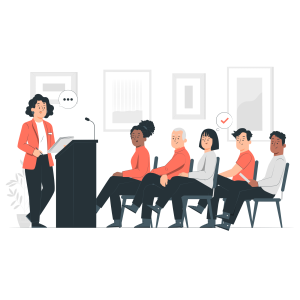FAIRly Obscure: An Edit-a-thon Exploring Anthropology, Communities, and Wikipedia Representation
Wiki page: https://en.wikipedia.org/wiki/Wikipedia:Meetup/DC/FAIRly_Obscure_Anthropology_Edit-a-thon
Presented by:
The University of Maryland Center for Archival Futures, the National Anthropological Archives, Smithsonian Institution; George Washington University’s Center for the Advanced Study of Human Paleobiology; The Bentley Historical Library and University of Michigan School of Information; the University of Missouri’s College of Information Studies; and the Council for the Preservation of Anthropological Records (CoPAR), and Wikimedia DC.
Event description
Are you interested in the history of anthropology? In archival description, outreach, and linked data? In FAIR and CARE principles for social science and scientific information? Join a co-sponsored edit-a-thon event to support the ethical description of anthropological knowledge and anthropological records focused on reworking and expanding related Wikipedia and Wikidata entries. This edit-a-thon will focus on editing, adding, and checking information on these publicly available and publicly maintained databases relating to anthropologists and anthropology. Interested audience may include community members, anthropologists, graduate students in anthropology, graduate students in information science, linked data nerds, and others!
No Wikipedia editing experience necessary. Opening ceremonial event will begin at 11:30am. Training will be provided, taking place 12pm to 1:00pm (Eastern time). Open editing time will run from 1:00pm to 4:00pm (Eastern time). At 2:30pm we will have a Wikidata demo. If you’ve never edited before, please plan to attend the training session.
December 4th: “Open House: Exploring the Tugwell Collection”
Abstract:
Explore the Tugwell Collection with Community Archives seminar students featuring highlights and tours of the Tugwell Collection. Light refreshments will be provided. This program is presented in collaboration with University of Maryland College of Information (INFO) and Center for Archival Futures (CAFe). Refreshments for this program are provided by the Friends of the Greenbelt Library.
December 4th: “Centering Community and Care in Rapid Response Research”
Anna Kijas, Assistant Director of Digital Scholarship, Head of the Lilly Music Library, Tufts University
Abstract:
Russia’s invasion of Ukraine on February 24, 2022 was a wake-up call for cultural heritage professionals worldwide. For several decades, cultural institutions have engaged in digitization of cultural artifacts, in light of the invasion, however, it became clear that the servers on which these digital objects are stored are as vulnerable as the buildings which house the analog originals. Saving Ukrainian Cultural Heritage Online (SUCHO) is a global grassroots initiative of more than 1,500 volunteers which formed as a response to the invasion to support the digital preservation of Ukrainian cultural heritage. SUCHO began as an emergency web-archiving effort, preserving more than 50TB of cultural data from over 5,000 websites of Ukrainian museums, libraries, and archives.
In this talk, Anna Kijas, co-founder of SUCHO, will share the story of SUCHO and explore how this initiative drew together a community of activists with a shared vision of ensuring that digitized and born-digital cultural heritage is pre-emptively protected in the future. She will focus on how SUCHO centered community and care, promoted collaboration, and developed relationships with Ukrainian institutions and cultural heritage professionals. Much as World War II laid the groundwork for robust cultural heritage protection organizations that still operate today, the global cultural heritage community can learn from the invasion of Ukraine to plan for a more resilient future for digital cultural heritage protection that centers concepts of community and care.
Bio:
Anna Kijas is Assistant Director of Digital Scholarship and Head of the Lilly Music Library at Tufts University. She is a co-founder of Saving Ukrainian Cultural Heritage Online (SUCHO), an initiative focused on safeguarding and preserving the digital cultural heritage of Ukraine during the Russo-Ukrainian War. Her research interests include exploring the affordances and application of digital humanities tools and methods in historical (music) research, the application of standards, including TEI and MEI, for open access research and publishing, and the use of minimal computing. Anna also researches and writes about nineteenth century music topics with a focus on gender, women, and performance criticism and reception. Her publications include a book entitled The Life and Music of Teresa Carreño (1853-1917): A Guide to Research, and open-access projects, including Documenting Teresa Carreño centered around Carreño’s performance career (1863-1917) and Rebalancing the Music Canon that aims to make musical works by historically marginalized and un(der)-represented people more discoverable, decenter the musical canon, and make data-driven music scholarship more diverse and inclusive. Anna is currently the Administrative Chair of the Music Encoding Initiative (MEI) and during 2019-2023 she served as an Executive Council Representative of the Association for Computers and the Humanities (ACH). Her work and contributions have been recognized with awards including the A. Ralph Papakhian Special Achievement Award (MLA), European Heritage Award / Europa Nostra Award 2023, Society of American Archivists Council Resolution, Walter Gerboth Award (MLA), as well as intramural awards and grants.
November 6th: “Community Archives: Empowering Voices and Preserving Heritage”
Corey Lewis, Assistant State Archivist, Maryland State Archives
Abstract:
Community archives are crucial in preserving diverse groups’ cultural heritage and collective memory. Corey Lewis, the Maryland Assistant State Archivist, has been a driving force in these efforts for the past twenty years. His expertise in archival practices, digitization, and community engagement has significantly impacted the field. His work with the Community Archives Initiatives has been particularly noteworthy, focusing on democratizing access to historical records, empowering underrepresented communities to tell their stories, and fostering a sense of identity and continuity.
On this month’s first Wednesday of the CAFe series, Corey Lewis will share his experiences and insights on community-centered archival practices. He will explore how integrating traditional archival methods with modern digital technologies can create innovative approaches to safeguarding the past while making it accessible to future generations. Corey will discuss the importance of inclusive, participatory archives and highlight how these efforts can reflect the rich, multifaceted history of Maryland’s diverse communities. This event is a unique opportunity to learn more about the lasting impact of community archives on the preservation and accessibility of cultural heritage.
Bio:
Corey A. Lewis is a distinguished leader in archiving and currently serves as the Assistant State Archivist at the Maryland State Archives. In his role, Corey oversees the information, appraisal, and digitization operations while acting as a liaison for information technology. Since joining the archives in 1999, Corey has gained extensive experience in imaging and digitization. His deep knowledge and expertise have been instrumental in advancing the technological capabilities of the archives, particularly in digitization operations and the development of electronic archives. Throughout his career, Corey has championed initiatives focused on enhancing access, improving efficiency, and fostering partnerships. His leadership has recently enabled the Maryland State Archives to collaborate successfully on several projects with community archives. Corey’s dedication to diversity, equity, inclusion, and accessibility was recognized last year when he received the Gertrude Makell Award for Programming. This year, he has been honored with the Victoria Walch Irons Emerging Leader Award from the Council of State Archivists, further acknowledging his outstanding contributions to the archival profession.
October 11th: “Citizen DJ Remix-a-thon”
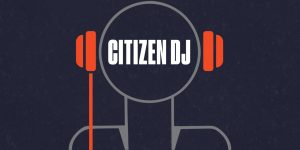
Abstract:
The Center for Archival Futures (CAFe) invites you to participate in a Remix-a-thon featuring the Library of Congress’s Citizen DJ project. Citizen DJ is a groundbreaking initiative that allows the public to explore and remix thousands of free-to-use sound recordings from the Library’s vast audiovisual collections. In this hands-on event, project creator Brian Foo will discuss the creative potential of the project and guide participants through the process of remixing and creating new works using the platform. Whether you choose to work individually or collaboratively, this event offers a unique opportunity to engage with historical sounds and generate original material. No prior experience is required—just bring your creativity! (And a laptop and headphones if you’ve got ‘em.)
Bio:
Brian Foo is an artist and computer scientist based in Washington, DC. His work focuses on making public resources like audiovisual collections, scientific datasets, and cultural objects more accessible and remixable through visualization, sonification, and play. He openly shares his creative and technical processes, along with tools for others to use and adapt. He is currently a Senior Innovation Technologist at the Library of Congress’s Digital Innovation Division, where he explores innovative uses of the Library’s content and services.
Jaime Mears is a senior innovation specialist for the Library of Congress Labs, where she supports research and experiments to better connect the Library to all Americans. She leads the Innovator in Residence program, a creative research residency for technologists and artists. In her previous role as a national digital stewardship resident, Jaime created the Memory Lab at DC Public Library, now an IMLS-funded national program to support personal archiving at public libraries. Jaime holds a master’s in library science from the University of Maryland iSchool.
October 2nd: “From Collections to Connections: Centering Belonging in Archival Futures”
Trevor Owens, Chief Research Officer, American Institute of Physics
Abstract:
Library and archives professionals often take collection centered mindsets to our work. Drawing on experience from two decades of work in digital history and cultural memory, Owens will discuss approaches to work with collections that cultivate and support personal connections and belonging. This will include discussion of key points from his recently published book After Disruption: A Future for Cultural Memory, in dialog with practical examples from his work as at the Library of Congress and the American Institute of Physics. He will show how ongoing work in libraries and archives can function as a context for action research to advance both theory and practice for how work with special collections can advance efforts in communities for equity, justice, and sustainability.
Bio:
Dr. Trevor Owens is a social scientist, historian, librarian, and archivist working to deepen the positive impact of mission driven organizations on society through humanities and social science research. Owens serves as the first Chief Research Officer of the American Institute of Physics. In this role, he is charged with implementing and leading AIP’s new operational unit, AIP Research. This new interdisciplinary research-driven center of excellence brings together teams of librarians, archivists, historians, and social scientists to execute a research strategy and agenda focused on the interplay of the physical sciences, relevant public policy, and disciplinary cultures, with the goal of empowering positive change in the physical sciences enterprise. Owens previously worked as the Director of Digital Services at the Library of Congress and as a Senior Program Officer and Associate Deputy Director for Libraries at the United States Institute of Museum and Library Services (IMLS). Owens is the author of four books, the most recent of which, After Disruption: A Future for Cultural Memory was published by University of Michigan Press in Spring of 2024. His previous book, The Theory and Craft of Digital Preservation, was published by Johns Hopkins University Press in 2018 and has won outstanding publication awards from both the American Library Association and the Society of American Archivists. His research and writing have been featured in: Curator: The Museum Journal, Digital Humanities Quarterly, Science Communication, New Directions in Folklore, and American Libraries.
September 18th: “Archiving the Crisis: What urgency should archivists feel regarding living archives of state-sponsored violence?”
Doran Larson, Edward North Professor of Literature, Hamilton College
Abstract:
Archives commonly address the sustainable physical holding, digitization, and other ways of creating lasting, accessible repositories of documentation of past and concluded events, albeit often ones with continuing contemporary relevance (e.g. the Tulsa Race Riot).
The American Prison Writing Archive (APWA) is a growing archive of nearly 4,000 non-fiction essays and poems by people currently incarcerated in the U.S. and since 2009. Fully searchable by author demographics, states, and key words, the APWA receives between 40-100 new written testimonials to prison conditions and experience each month.
This talk, by the APWA’s founder and current co-director, will address the stakes and potential of the APWA (and like projects) and the urgency of seeing acts of witness to current instances of state-sponsored violence, neglect, gross incompetence, and willful deprivation brought into public venues in a timely fashion. Fully aware of the hazards for both the witnesses and for their facilitators, and with sharp attention to the need for ethical, non-extractive protocols and practices, this paper will argue that the urgency to respond to first-person witness’s aspirations to get their work before the public should not be less than what we might expect from outlets and platforms for those serving first-person witnesses to active war zones—witnesses, that is, who write from desperation both in their current conditions and in their need to move public opinion, direct action, and intervention in ongoing (criminal) abuse and neglect.
The talk will cover the history of the APWA, its potential to move hearts and minds, and—due to this potential—the need to see prison witness disseminated both carefully and expeditiously.
Bio:
Doran Larson is Edward North Professor of Literature at Hamilton College. He led a writing workshop inside Attica Correctional Facility from 2006 to 2016. He is the founding organizer of the AA-degree granting Attica-Genesee Teaching Project, and of the award-winning AA-degree granting Hamilton-Herkimer College College-in-Prison Program at Mohawk and Mid-State Correctional Facilities. He is the author of Witness in the Era of Mass Incarceration: Discovering the Ethical Prison (2017). He is the editor of Fourth City: Essays from the Prison in America (2014), the largest print collection to date of non-fiction essays by currently incarcerated people writing about their experience inside. He founded and now co-directs The American Prison Writing Archive, a Mellon-funded and fully searchable digital archive of over five million words of first-person prison witness. His new book, Inside Knowledge: Incarcerated People on the Failures of the American Prison, was published by NYU Press in January.
September 4th: Fall Faculty Research Showcase
Description: Join us for our Fall Faculty Research Showcase! Watch faculty present exciting updates on their ongoing projects. Get a chance to see current research initiatives developing innovative approaches and emerging trends. Swing by for a chance to connect over common interests!
May 1st: “Imagining Decolonial Archival Futures”
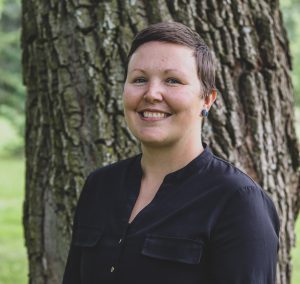
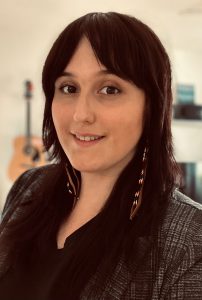
Krista McCracken (Left), Award-winning public historian and Archivist
Skylee-Storm Hogan-Stacey (Right), Historian, Author, and Research Analyst
Abstract:
Drawing on their recent book, Decolonial Archival Futures, Hogan-Stacey and McCracken will discuss unsettling Western archival practices within Canada, the United States, New Zealand, and Australia. This presentation highlights the transformative potential of decolonization within archival practices through practical examples, with an emphasis on envisioning decolonial possibilities that are Indigenous-led and community-driven. Drawing on their personal experiences, the speakers will highlight the complexities of challenging colonial narratives embedded in archival processes. Through critical analysis and practical examples, McCracken and Hogan-Stacey share insights into incorporating Indigenous perspectives, methodologies, and voices in archival work.
Bios:
Krista McCracken: Krista McCracken is an award-winning public historian and archivist. They work as a Researchers/Curator at Algoma University’s Arthur A. Wishart Library and Shingwauk Residential Schools Centre, in Baawating (Sault Ste. Marie, Ontario) on the traditional territory of the Anishinaabe and Métis people. Krista’s research focuses on community archives, Residential Schools, access, and outreach. In 2020, they won the Best Article in Indigenous History prize awarded by the Canadian Historical Association’s Indigenous History Group for their article “Challenging Colonial Spaces: Reconciliation and Decolonizing Work in Canada’s Archives.”
Skylee-Storm: Skylee-Storm Hogan-Stacey is a historian, author, and research analyst currently living and working on the unceded territory of the Algonquin Anishinaabek in Ottawa, Ontario. A descendant of the Mohawk Nation of Kahnawà:ke, Skylee-Storm has explored community archival practices, Indigenous archival access, Residential School history, Indigenous-Crown legal history, and oral history. Since 2019, Skylee-Storm has worked with Know History Historical Services as a research historian in their Ottawa office.Skylee-Storm began their work unpacking and understanding Indigenous archivy when they joined the Shingwauk Residential Schools Centre in 2015. She has remained a collaborator with the Centre on projects related to community archives and site history. Skylee-Storm completed a rewrite of the Ontario Provincial Heritage Program plaque for Shingwauk Hall in 2022. After working with the Shingwauk Residential Schools Centre, Skylee-Storm has become an advocate for critiquing archival power dynamics and settler Canadian historical narratives. Their forthcoming book with Krista McCracken, Decolonial Archival Futures, continues this work.Skylee-Storm is currently on an interchange assignment with the office of the Independent Special Interlocutor for Missing Children and Unmarked Graves and Burial Sites associated with Indian Residential Schools, as a policy analyst focused on archives and Indigenous data sovereignty.
April 10th: “Equity in public access to research result: Case study from National Agriculture Library”
Jwan Khisro, postdoctoral researcher, College of Information Studies, University of Maryland.
Abstract:
There is a need for a better understanding of equity perspective in public access to research results, accelerates discovery, promotes collaboration, fosters public trust and innovation, and provides opportunities for all to participate in research. It is vital to ensure that science and research benefit everyone. Answering the call from the Office of Science and Technology Policy (OSTP) to ensure Free, Immediate, and Equitable Access to Federally Funded Research. Equity in public access to research results is the subject of this study and is currently in development by a collaborative team based at the University of Maryland, College Park. Therefore, this study aims to improve understanding of equitable access to federally funded research results. By enquiring the following research question: how federally funded research results can be equitably accessible to the public. The study employs a qualitative approach with an interpretative case study method.
Bio:
Jwan Khisro is a postdoctoral researcher at the College of Information Studies, University of Maryland. The primary goal of Jwan’s postdoctoral research is to contribute to and advance digital government practices and policies research agenda by focusing on two research areas 1) Equity perspective in public access to research results and 2) AI in digital government. Jwan conducts her research and collaborates with the USDA, and National Agricultural Library on implementing federal, agency, and departmental policies related to public access to federally funded research. She earned her PhD in informatics at the Department of Applied IT, University of Gothenburg, Sweden 2022. She also earned a Licentiate degree in informatics at the Department of Information Systems and Technology (IST), Mid Sweden University 2019 following a master’s degree in informatics, University of Gothenburg, 2013. Jwan’s research focuses on multidisciplinary fields studying the Constraints of digital transformation in the public sector from various perspectives such as IT Governance, investment budget, and digital infrastructure. Jwan’s work has appeared in academic journals such as the Enterprise Information Systems Journal and the Transforming Government: People, Process, and Policy. She regularly presents her research at top information systems conferences including AMCIS, EGOV, and HICSS.
March 6th: “The Ambivalences of the Unfixed”
Jamie A. Lee, Associate Dean for Faculty Affairs and Associate Professor Digital Culture, Information, and Society at the School of Information, University of Arizona
Abstract:
Shifting archival approaches from “product to process” and “record to people” require radical inquiries into the archival practices of description and the expediency of such labor, especially in the digitally-mediated realm of virtual repositories. I consider stereotypes and the ways they function to fix notions of personhood in archival contexts and make expediency even possible. Moving from assumptions of fixity, I will explore the ambivalence of the un-fixed and the unfixable in the digital realm. Considering archives — both physical and digital — then, as fixed materials holds people and their shifting identities captive through their own archival records. Rather than the assumed certainties that stereotypes can inspire and that fixed archival records seemingly confirm, I look to the role of archival ambivalence in making room for complex personhood in the re-imagining description practices through digital archives. Centering the P. Carl Transitional Eyewear eyeglass collection (28 pairs of glasses that span over three decades) as a distinct site for interrogating the paradoxical notion of fixity, I challenge the concept and practice of stereotype through their own (un)becoming subjectivities. In considering the shifting subject that comes into view with each new pair of eyeglasses, Avery Gordon’s concept of complex personhood is elucidated as a theoretical statement that animates archival understandings of people as living complicated, dynamic lives that cannot be captured and viewed as forever fixed and unchanging. Through engaging the potentials of digitality, I will explore complex personhood as a creative tool to address the complicated and complex cultural imaginings, affective experiences, multi-perspectival voices, and animated and embodied objects that trace power’s presence in the archives. This presentation is meant as a playful unsettling through the ambivalences that a focus on the unfixed reveals.
Bio:
Jamie A. Lee is Associate Dean for Faculty Affairs and Associate Professor Digital Culture, Information, and Society at the School of Information, University of Arizona. They are scholar, activist, filmmaker, archivist, and oral historian. They founded and direct the Arizona Queer Archives where they train community members on facilitating oral history interviews and building collections in and with their own communities. With storytelling at the heart of their life’s work, Lee also directs the Digital Storytelling & Oral History Lab and co-founded the Critical Archives and Curation Collaborative, the co/lab, through which they collaborate on such storytelling projects as secrets of the agave: a Climate Justice Storytelling Project, and the Climate Alliance Mapping Project, CAMP. Lee’s 2021 book, Producing the Archival Body, engages storytelling to re-consider how archives are defined, understood, deployed, and accessed to produce subjects. Arguing that archives and bodies are mutually constitutive and developing a keen focus on the body and embodiment alongside archival theory, Lee introduces new understandings of archival bodies that interrogate how power circulates in archival contexts in order to build critical understandings of how deeply archives shape the production of knowledges and human subjectivities. For more on Lee’s projects, visit www.thestorytellinglab.io.
February 7th: “The Hermeneutics of Data Management Plans: Open Science Policy in the United States“
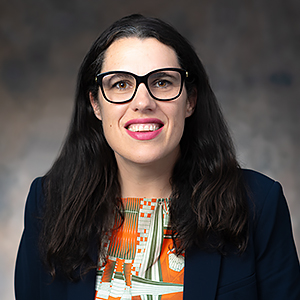
Megan Finn, Associate Professor, American University, Communication Studies, Washington DC
Abstract:
The United States’ science data policy has landed in a weird place. Data management plans are now required on federal grants – this is the most significant recent open science data law in the US. There are several reasons given in various administrative rules for more access to and transparency around research data including equity, research replicability, projecting the superiority of American science, ensuring the return on investment to taxpayers, incentivizing better research data management, legitimizing a future for data science and data-driven research, and enhancing the quality of science. Some of these justifications are contradictory and none of these justifications make it obvious that data management plans would be the best mechanism for ensuring science data transparency in federally funded research. This paper asks, how did the US end up with “data management plans” as a requirement? And, if we take data management plans seriously, what do these plans tell us about the future of science data? I will first examine data management plan requirements for science researchers in the US (particularly the National Science Foundation). Next, I will look at what the data management plans themselves say, drawing from my research team’s corpus of nearly 1000 data management plans from funded projects. I will offer different approaches to reading data management plans: as scientific furniture, as instruments for accessing funding, as evidence of the neoliberalization of science, as a process document for scientific knowledge production and institutional coordination, as a fantasy document, as instructions for the future, aligning temporalities, and as part of the institutionalization of data-oriented science. By sharing findings about the purposes and premises of planning for data management we argue they are an important vehicle for the project of open science.
Bio:
I have a number of research projects which are historical and contemporary empirical studies of responsible computing and data governance. My work examines relations among policies, infrastructures, and practices in the production, circulation, and use of data and information. I examine these themes in a book, called Documenting Aftermath: Information Infrastructures in the Wake of Disasters, with MIT Press (October 2018). The book is an examination of how changing public information infrastructures shaped people’s experience of earthquakes in Northern California in 1868, 1906, and 1989 followed by an analysis of the institutions, policies, and technologies that shape today’s postdisaster information landscape. I argue that information orders—complex constellations of institutions, technologies, and practices—influence how we act in, experience, and document events. What I term event epistemologies, constituted both by historical documents and by researchers who study them, explain how information orders facilitate particular possibilities for knowledge.
Before moving to SOC at AU, I was a professor at University of Washington’s Information School. I was a faculty member of the DataLab at the INFO College, and an affiliate of the UW’s eScience Institute, where, as a part of the Data Science Studies group, I co-convened a talk series, “Data Then and Now” from 2019-2021. I was an advisor with my university’s Science, Technology and Society Studies (STSS) program where I have been lucky enough to advise incredible students from Forestry, Law, and Urban Planning. I was lucky enough to supervise Meg Young, now a researcher at Data and Society.
In 2022-2023 I was a visiting scholar at UC Berkeley’s Center for Science, Technology, Medicine, and Society and Stanford’s Department of Communication and HAI. In 2021-22 I was a Lenore Annenberg and Wallis Annenberg Fellowship in Communication at the Center for Advanced Study in the Behavioral Sciences at Stanford University. From 2012-2014 I spent two wonderful years as a Postdoctoral Researcher at Microsoft Research New England in Cambridge, MA with the Social Media Research Group.
February 14th: Douglass Day
Douglass Day is an international hybrid event hosted and streamed by Penn State University each year on February 14th, Douglass’ chosen birthday, to celebrate Black history through a transcribe-a-thon and birthday cake bake-off. CAFe is partnering with the Driskell Center, STAMP, BCaT Lab, and scholars in the Michelle Smith Collaboratory for Visual Culture in the Department of Art History and Archaeology at UMD to host a Douglass Day transcribathon event with food and fun on February 14th. Show off your baking skills by bringing a birthday cake to share.
On Douglass Day, participants will learn how to transcribe handwritten items in the general correspondence of Frederick Douglass. These papers are held at the Library of Congress in Washington, DC, and have been made digitally available for transcription through the By the People virtual volunteering project. Comprised of 8,731 pages, this collection provides insight into Douglass’ social and political life through his exchanges with family, friends, activists, politicians, and others between 1841 and 1912. Transcribing these materials ensures resources on specific people and events are made more robust, and thus more discoverable and accessible; it also brings those who are interested in history together to learn more about a common theme. These letters will provide rich insight into the life and work of Frederick Douglass that are not yet widely accessible.
